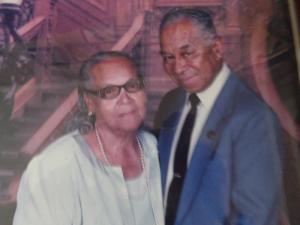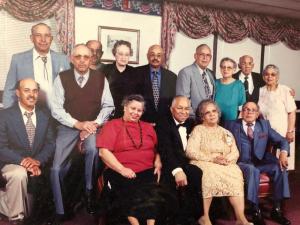Chief William Daisey: Living a blessed life

For William Daisey, the title “Chief” is not just some honorarium or nickname. He is a former Nanticoke tribal chief.
Today, he has come dressed for the occasion, wearing his blue and white tribal headdress, a Western-style shirt and black moccasin slip-on shoes. His Dover home, located off Route 13, is grandfatherly, with its tan carpeting, pictures of family on the tan walls and CNN on the television.
He takes a seat on the recliner and begins unfolding a story that began in Lewes in the midst of the Great Depression. At 87 years old, Daisey has experienced segregation, prejudice, economic hardship and the death of his wife of 63 years in 2014. Describing growing up near Millsboro, Daisey said it was not good. “Overall, it was difficult. We grew up in the Depression, which wasn’t a good start. I lived on a farm, but people did not have any money to buy the goods you were providing so you had to depend on the soup lines.”
As a Native American, Daisey said, he and his family had to maintain a low profile to survive. He said the Oak Orchard/Millsboro area was home to many Native families, most of whom had migrated to Delaware after being chased off their land in Maryland. He said Native Americans in those days adapted to new ways while trying to maintain as much of the traditional ways possible.
“Schools and everything else were segregated. On the farm, we were taught to survive. Hunting and fishing and clamming and things. To prepare for the winter you did a lot of canning. You dug holes in the ground and placed apples or potatoes or whatever you could to preserve it,” he said.
Working on the farm could be backbreaking and occasionally dangerous work.
“My brother and I were plowing the land. He was driving. The plow went over this underground stump and went over my head and almost knocked me unconscious,” he said.
“Picking cucumbers was the worst job I had on the farm,” Daisey continued. “It was a cash crop for us. When you went into the field, it was invariably damp from the dew on the ground. The smallest ones were worth more. When it started to dry out, then came your field mice. When your pants started getting drier, then came your bumblebees and once in a while, snakes. Meanwhile, you were bent over picking these dumb things.”
Eventually, Daisey and his family got a tractor, but it was very primitive, even by the standards of the day.
“You had to crank that joker,” he said. “If you didn’t crank it right, you could break your arm.”
And God help you if you got sick, Daisey said.
“When you were sick, you pretended to not be sick if possible,” he said. “Medicine was a last resort. Kerosene and sugar was for coughs. That was one of the better ones. There used to be an Indian medicine man that would come around every year and stop every year at Rosedale Inn. There was one medicine he used to sell that was red. We used to use that for everything. You didn’t consume it, you inhaled it. You had to be careful when you inhaled it because you felt like your head was going to blow off.
“It’s probably illegal now,” he says with a laugh.
Men were taught to make bows and arrows and spears, while women were taught to be mothers, Daisey said. He came from a very large family; twins ran very deep in the family, he said, as his father had twins with his first wife, and together, his mother and father had three sets of twins plus a set of triplets.
“You can see how the family grew,” he said.
Growing up, Daisey said, schools for Native Americans only went up to eighth grade. He had to walk four miles each way to get to school.
“The teachers were good,” he said. “But they had nothing to work with. The books were all tattered and torn.”
Daisey recalled a day when he and his siblings were walking home from school on a cold and rainy day. They were spotted by a white bus driver who gave them a ride because he was familiar with the kids from driving past their farm every day.
“He never did that again,” Daisey said. “I imagine if his superiors had found out he did it that one time, he would have been fired. But that little act of kindness. You remember those things.”
After the eighth grade, the only place people of color could get a high school diploma was Howard High in Wilmington. The distance prevented many promising Native American and black students from going, but fortunately for Daisey, his grandmother lived in Wilmington so he was able to get his diploma. He said one of the highlights of attending Howard was meeting Jackie Robinson.
During World War II, Daisey said, things opened up a bit for people of color to get better jobs. He said two of his brothers were able to get good-paying jobs because they were so light-skinned they could pass as white. By passing as white, they could also get into the Merchant Marine and civil service.
Daisey himself moved back to Sussex County after high school and married his wife of 63 years, Shirley. They had six children together - including a set of twins, of course - but he recalls struggling to explain to them the realities of institutionalized racism.
“I remember going down to Rehoboth with the kids when I was older and couldn’t ride on those little bumper cars or anything. How to explain to a child that they can’t ride on cars that were fun because of the color of their skin?” he said.
Daisey got a job in a body shop, working as a body and fender man, painting vehicles. After that and another body shop, he got a job working on an air base in Georgetown as a jet engine mechanic. That trade led him to working in Dover painting airplanes where he worked until he could get a job in the civil service.
Seeking a change, Daisey and his family moved to Oakland, Calif., where they lived for five years before moving back to the East Coast to take care of Shirley’s ill mother.
Returning to New Jersey, where his wife was from, Daisey began to get involved in politics. He had attended the March on Washington in 1963, where he heard Martin Luther King Jr. speak.
“I never heard anyone speak like that,” Daisey said. “What was refreshing was to see so many Caucasions involved in it, because they didn’t have to be involved in it. It sort of renewed your faith in democracy. It was beautiful. I saw that politics could help you if you get the right people in there.”
His first foray into the political area was a run for state representative in Camden, N.J. “I thought I could make a difference,” he said.
Daisey lost that race, but he started working on the local recreation commission before getting his first school administration job at Camden Skill Center, a trade school. Daisey said his family at that point wanted to come back to Delaware, and they settled in Dover. He worked for the Lake Forest School District, but the itch for politics came back, and he ran for Dover city council, losing his first race but winning his second election. He served on the council from 1987 to 1993, also taking four cracks at running for mayor in 2004, 2006, 2007 and 2010.
Daisey said the accomplishment he is proudest of was improving the city’s hiring process to help open doors for minorities to serve in city government.
“At that time, there was only one minority on the police force, and no other minorities other than building and grounds. I tried to make it a fairer process. When I left, you had minorities in more places,” he said. “Jobs were fair.”
As a younger man, Daisey was given the tribal name Thunder Eagle, which he said came from his ability to talk loud and see well. Now nearly 90, he laughs at the contrast to today.
“I can’t see very well now, and when I talk I get hoarse,” Daisey said.
Getting serious again, he said, “They gave you a tribal name because it was thought that the Great Spirit would only recognize you by your tribal name.”
After he left city council, Daisey became more involved in tribal affairs. Much like a municipal government, the Nanticoke Indian Association is run by a council with an elected chief, who serves a two-year term.
Daisey was first elected to serve on tribal council and served as chief until 2015 when he retired at the age of 84. He has spinal stenosis, which explains the way he shuffles more than walks now.
Despite all the hardships he faced, the word Daisey always keeps coming back to is: blessed. He feels blessed that he survived his upbringing and accomplished what he has in life, because things could have been a lot different. Daisey likes to recall moments in his life that were out of his control but eventually worked out in the end.
He put his life story into words in a book, “The Life and Times of William ‘Thunder Eagle’ Daisey - A Delaware Indian Chief: An Autobiography.” He said the book began as a way to answer questions from his children and grandchildren.
“They need to know what happened with our family, what it was like growing up back then and why we did certain things,” Daisey said.
























































